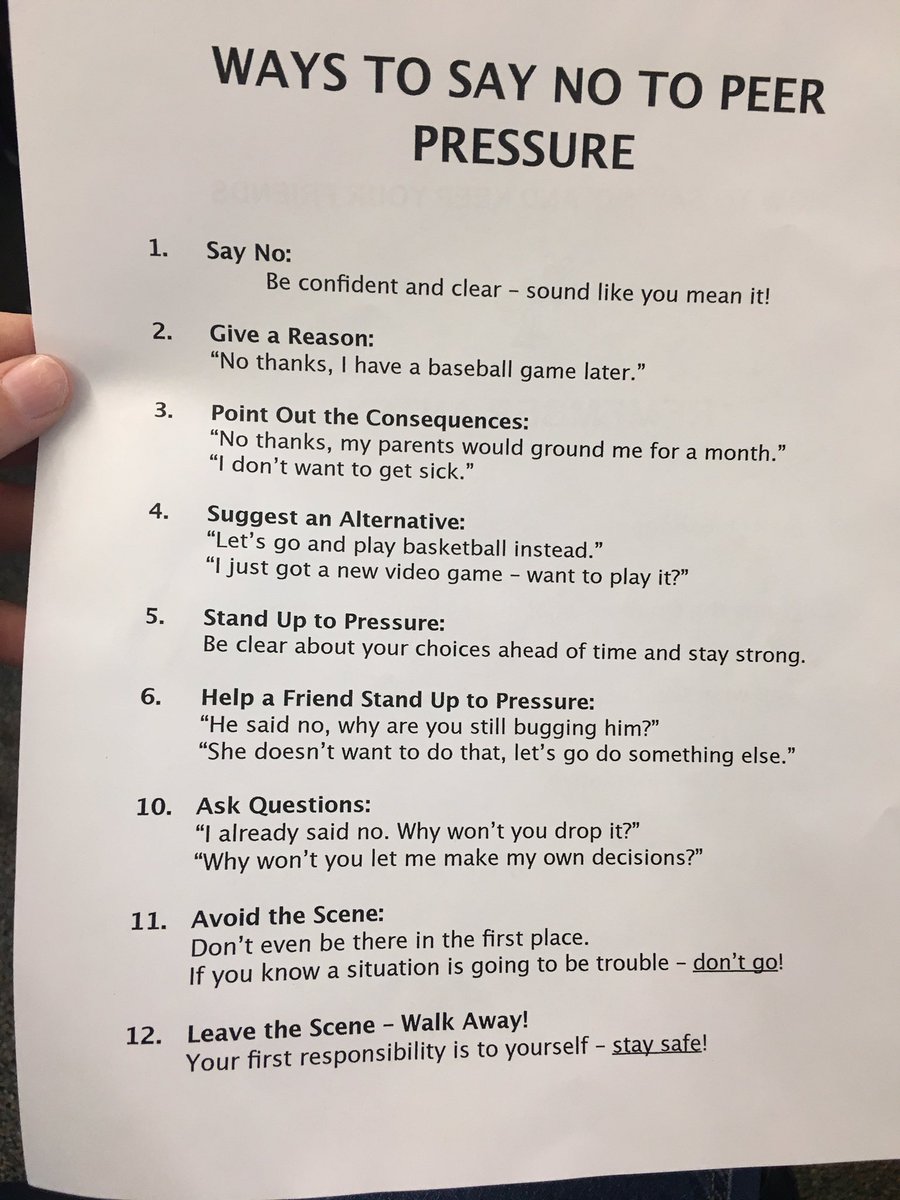Peer pressure is an omnipresent phenomenon that manifests in various forms, often pressuring individuals to conform to societal norms or engage in behaviors they might otherwise eschew. Alliteration, the literary device that involves the repetition of initial consonant sounds, can serve as a powerful mechanism for articulating resistance against peer pressure. This article aims to explore a plethora of alliterative phrases that empower individuals to assertively say no to peer pressure while simultaneously fostering a sense of individuality and self-worth. Such phrases not only resonate effectively in the context of youth engagement but also encourage broader societal recognition of the importance of personal agency.
When confronted with the seductive allure of conformity, it is pivotal to cultivate a linguistic arsenal that articulates conviction. The employment of alliteration turns abstract defiance into memorable affirmations, encouraging individuals to resist the compulsion to acquiesce. This discourse will delve into the significance of using alliterative expressions as a rallying cry against undue influence, offering a detailed examination of practical phrases that challenge the receiver’s will to conform.
In a society replete with social pressures, the capacity to articulate dissent through alliterative phrases allows for not only personal liberation but also inspires others. As individuals internalize and vocalize these affirmations, they can foster an atmosphere where critical thinking supersedes conformity. Let’s explore significant alliterative expressions that can be employed when confronted with peer pressure.
Empowering Expressions: The Art of Refusal
Declining is not simply a matter of saying “no.” It is about asserting one’s values and boundaries. A robust selection of alliterative phrases can serve as a verbal shield, thereby fortifying an individual’s resolve against peer coercion.
One compelling example is “Passionate about Principles.” This phrase emphasizes a commitment to one’s beliefs over the transient approval of peers. By framing the choice in relation to personal principles, individuals remind themselves that their decisions should be founded on values rather than on the fleeting expectations of others.
Another exemplary phrase is “Defiance Defines Dignity.” This expression encapsulates the idea that standing firm against pressure is an assertion of one’s dignified self. It highlights that refusal is not a sign of weakness but rather a declaration of strength and self-respect.
The phrase “Courageous Choices Count” is another assertion reinforcing the notion that making choices grounded in personal conviction is paramount. This serves as a reminder that every decision made in defiance of peer pressure contributes to the tapestry of one’s identity.
These expressions do more than provide linguistic tools; they elevate the act of refusal into a profound statement of self-affirmation. The use of alliteration here not only enhances memorability but also imparts a rhythmic quality that encourages retelling and reinforcement.
Transforming Refusal into Resilience
In navigating the tumultuous waters of adolescence and young adulthood, resilience becomes an requisite trait. Alliterative phrases can play an instrumental role in cultivating this resilience, facilitating a mental framework that empowers individuals to withstand pressure.
Consider the phrase “Assertive Against Adversity.” This communicates the necessity of maintaining one’s autonomy in the face of challenges. It underscores the significance of standing one’s ground and can serve as a mantra during moments of vulnerability.
Furthermore, “Stand Strong, Stay Stalwart” reinforces the notion of steadfastness. This encourages individuals to maintain their position without wavering in the face of collective pressure. It serves as a reminder that the strength to say no lies within oneself, irrespective of external influences.
The expression “Freedom from Fear” acts as a clarion call to liberate oneself from the apprehension that often accompanies dissent. It intimates that the fear of isolation or ridicule perpetrated by peers can be transcended by a commitment to one’s own principles and desires. This phrase acknowledges the emotional landscape of resisting peer pressure while simultaneously offering a pathway through it.
Building Community through Collective Courage
Self-assertion against peer pressure can also lead to collective empowerment. When individuals vocalize their refusals, they may inspire others to do the same, thus fostering an environment of mutual support. The communal aspects of resisting peer pressure through alliterative expressions cannot be overstated.
“Together, We Triumph” is a phrase that underscores the essence of solidarity. It speaks to the notion that collective strength can be found in shared experiences and unified voices. When individuals band together, the potency of their refusals gains momentum, creating an environment where peer pressure is less likely to flourish.
Another poignant phrase is “Resistance breeds Resilience.” This encapsulates the power of collective defiance. When individuals engage in collective resistance, they cultivate a more resilient community that can withstand pressures from various societal fronts.
Additionally, “Empowered Ensemble” celebrates the diversity of voices that come together in shared resolve against peer pressure. It highlights the importance of creating a popular culture that honors individuality and encourages non-conformity, thereby dismantling the societal norms that perpetuate peer pressure.
Capitalizing on these collective alliterative expressions, groups can articulate a louder and clearer message that resonates beyond individual refusal. The aggregation of these expressions into a unified cause fosters an atmosphere in which individuals feel safer to assert themselves, allowing for duplication of this assertiveness within their communities.
Conclusion: A Call to Action
The ability to say no to peer pressure is not just an individual endeavor but a collective movement towards fostering a culture of empowerment and self-acceptance. By leveraging alliterative expressions, individuals can firmly articulate their choices, thereby cultivating an unwavering sense of self. The phrases elucidated in this discussion are not merely linguistic constructs; they symbolize a deep-seated commitment to personal integrity and communal solidarity.
In a world rife with social influences, the challenge remains: how will each individual respond to the pressures surrounding them? Armed with the power of alliteration, the call to resist peer pressure is both potent and poetic. The time is ripe for individuals to harness these expressions as a beacon, guiding themselves and others towards a life led by personal conviction and authentic choices.
